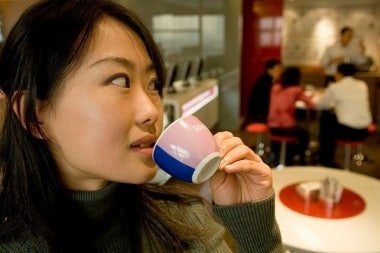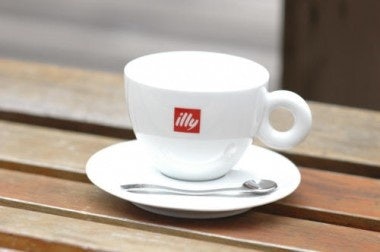78-Year-Old Gourmet Italian Coffee Maker Shooting For 10 Percent Of China Coffee Market#

illy opened the Shanghai branch of its Università del Caffè in 2007 (Image © Daniele Mattioli/Anzenberger)
Starbucks may get most of the press, but China's piping hot (pun intended) coffee market is home to dozens of players from at home and abroad, from Japan's UCC to Columbia's Juan Valdez to Italy's illy. Now celebrating its tenth year in mainland China, the 78-year-old illy occupies an interesting niche, comprising a relatively small amount of market share but enjoying a reputation as a more "high-end" brand than many of its competitors. Via a savvy expansion scheme, which prioritized five-star hotels and upscale restaurants over massive cafe construction or mass-market product lines, illy's China strategy provides a valuable case study for anyone interested in differentiating a brand in a young but crowded market, in which consumer education remains highly segmented and smart marketing is everything.
From iFeng, which writes this week that "Starbucks educated Chinese consumers [about coffee], and now illy is swooping in to evangelize" (translation by Jing Daily team):
"As long as we take three to five percent of the coffee market, that's a lot," illy China general manager Zhang Guojun (张国骏) recently told "Global Entrepreneur" magazine.
illy is not a simple competitor of Starbucks -- what sets it apart from the world's largest coffee chain is that illy's main business is the production and sale of coffee beans, coffee machines and accessories. In Italy, illy is ubiquitous at high-end hotels and restaurants, and the company has pursued a similar tack in China. Currently, illy is the exclusive coffee provider at the Shanghai Peace Hotel, the Portman Ritz-Carlton and other five-star hotels, and can be found at chains like Haagen-Dazs and Shanghai's Wagas.
Even though its business is quite different from that of Starbucks, Zhang Guojun is justified in mentioning illy's American competitor. In terms of the history of coffee and Chinese consumers, we can say that instant Nescafe sachets played the role of "enlightener" [in the 1980s and 1990s]; Later, Starbucks tested, and expanded, the boundaries of the market, eventually popularizing coffee culture in China. Nowadays, in major cities, Starbucks has become a part of people's daily lives, and is no longer a status symbol. Indeed, China is now becoming a country of coffee consumers. Starbucks has opened more than 450 stores in the country since 1999, and over the last 10 years, coffee consumption in mainland China has risen 12-15 percent annually.
"Starbucks is slowly expanding the coffee market, and illy smells opportunity", Zhang Guojun said. "We think 5-1o percent of China's coffee consumers want another option, and illy is one of them."
The article goes on to suggest that part of illy's success in China is due to its distinctive red-and-white logo, which is prominently displayed in lightboxes at points-of-sale, and its relationship with Haagen-Dazs, which, despite its mass-market reputation in the United States, is still considered a premium brand in China. The article also mentions the establishment of the Shanghai branch of illy's "Università del Caffè", which offers educational courses for baristas, bartenders, hotel managers, coffee growers and consumers, in 2007 as a smart branding exercise.

illy China is shooting for 3-5 percent of Starbucks' market share
Continuing, the article notes that 75 percent of illy's business in China currently comes from hotels and restaurants, but the company is looking to increase its retail presence to better compete with the likes of Starbucks and UCC:
"Over the last two to three years, we've averaged 30-40 percent growth in our retail channel [in China]", illy CEO Andrea Illy recently said, "because, before, [the Chinese] were drinking coffee exclusively at coffee shops, but now they're increasingly drinking coffee at home." To meet demand from at-home coffee drinkers, illy has begun to appear on more retailers' shelves, but mostly at supermarkets that carry a decent amount of imported goods, such as [France's] Carrefour and [Germany's] METRO.
However, the company is also exploring the possibility of expanding into more convenience stores, particularly in areas with a large concentration of white-collar workers.
The article then adds that illy will boost its consumer outreach this year via new "Experience" retail locations, at which shoppers can buy coffee or watch demonstrations of illy coffee machines. While this is part of illy's broader retail expansion scheme, as Zhang Guojun suggested, "these stores will [also] help us better understand consumer thinking, and figure out how best to promote ourselves in the China market." Zhang added that illy is also using its online store, which launched this spring, as another way to gauge Chinese consumer preferences.
Currently, Zhang said, 60,000 cups of illy coffee are consumed every day in China, yet the country accounts for less than 1 percent of the company's global sales. Now, Zhang Guojun is shooting for China to comprise 10 percent of illy's global market.
"In the China market," Zhang said, "this won't be difficult."